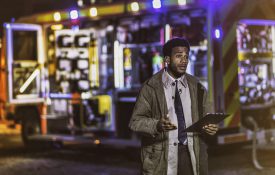-
An Indirect Damage of Terror Attacks: Higher Traffic Fatalities
The Atlantic: On Friday, convicted terrorist Adis Medunjanin was sentenced to life in prison for plotting an attack on the New York City subway system several years back. Public transit has been the target of
-
Estimating Risk
BBC: How good at you at estimating risk? Claudia Hammond talks to Wolfgang Gaissmaier about his analysis of the increase in fatal car accidents in the USA following the 9/11 attacks Watch here: BBC
-

Repeated Exposure to Media Images of Traumatic Events May Be Harmful to Mental and Physical Health
From 24-hour cable news to YouTube and Twitter, today’s mass media can turn local disasters into international events within minutes, and research reveals that widespread transmission can have a traumatic impact far beyond the people who are directly exposed.
-
Fear and Driving Opportunity Motivated Changes in Driving Behavior After 9/11
A catastrophic event – such as a terrorist attack, a natural disaster, or market collapse – often strikes twice. There is the damage caused by the event itself, as lives are lost or left in
-
9/11: What else it taught us
Boston Globe: Sept. 11 transformed the world of American ideas in many ways—fueling sharp debates about America’s role in world affairs, about the clash of religions, about freedom and security. Money flowed into counter-terrorism research.
-
9/11 Psychology: Just How Resilient Were We?
TIME: 9/11 was devastating in terms of lives lost — nearly 3,000 people were killed in the attacks — but it was not physically destructive (with the obvious exception of Ground Zero) on the same

